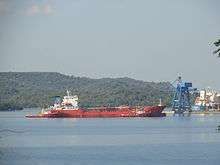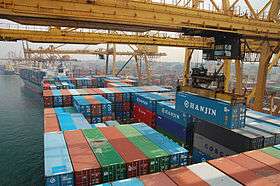Sri Lanka Ports Authority
 | |
 Port of Trincomalee | |
| Government-owned corporation | |
| Predecessor |
|
| Founded | 1 August 1979 |
| Headquarters | Colombo, Sri Lanka |
Key people |
|
| Revenue | [1] |
| [1] | |
| [1] | |
| Total assets | [1] |
| Total equity | [1] |
| Owner | Government of Sri Lanka |
Number of employees |
|
| Parent | Ministry of Ports and Shipping |
| Website | slpa.lk |
Sri Lanka Ports Authority (SLPA) is the state-owned operator of major commercial ports in Sri Lanka. Founded in 1979, SLPA currently operates ports in Colombo, Galle, Hambantota, Kankesanthurai, Oluvil, Point Pedro and Trincomalee.[2] As of 31 March 2013 SLPA had a 3% stake in Colombo Dockyard.[3]
History
The Sri Lanka Ports Authority Act No. 51 of 1979 established the SLPA by amalgamating Colombo Port Commission, Port (Cargo) Corporation and Port Tally and Protective Services Corporation.[4][5] The purpose of SLPA was to develop, maintain, operate and provide port and other services in the ports of Colombo, Galle, Trincomalee and other "specified ports".[6]
References
- 1 2 3 4 5 "Sri Lanka Ports Authority: Annual Report 2011" (PDF). Parliament of Sri Lanka.
- ↑ "Location". Sri Lanka Ports Authority.
- ↑ "Colombo Dockyard: Annual Report 2013" (PDF). Colombo Dockyard. p. 77.
- ↑ Tan, Chwee Huat (2004). Dictionary of Asia Pacific Business Terms. Singapore University Press. p. 258. ISBN 9971-69-275-9.
- ↑ de Alwis, A. Godwin (20 April 2003). "Lalith - The architect of the Sri Lanka Ports Authority". The Island (Sri Lanka).
- ↑ "Sri Lanka Ports Authority Act No. 51 of 1979". LawNet.
External links
This article is issued from
Wikipedia.
The text is licensed under Creative Commons - Attribution - Sharealike.
Additional terms may apply for the media files.
